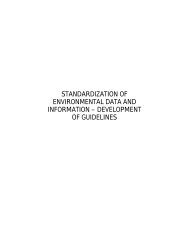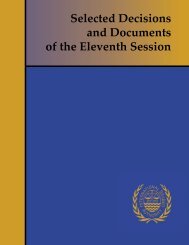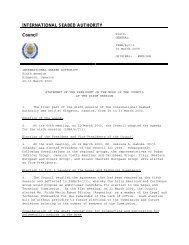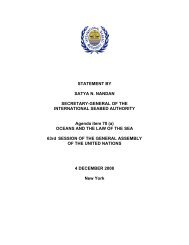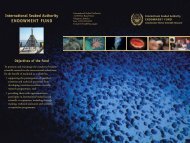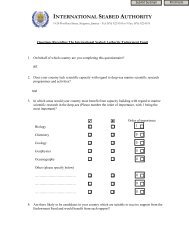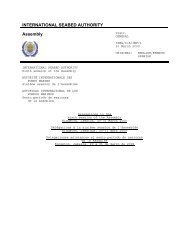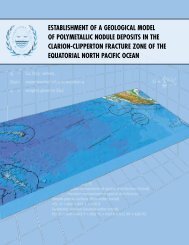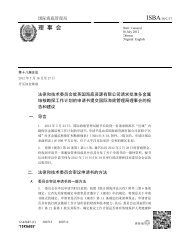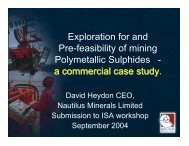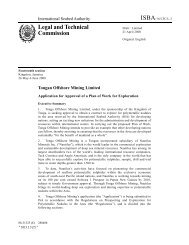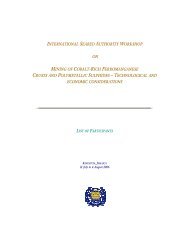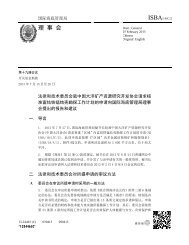Selected Decisions and Documents - International Seabed Authority
Selected Decisions and Documents - International Seabed Authority
Selected Decisions and Documents - International Seabed Authority
Create successful ePaper yourself
Turn your PDF publications into a flip-book with our unique Google optimized e-Paper software.
71. At the end of its meeting during the fourteenth session, the Commission requested the secretariat to<br />
prepare a revised text of the proposed draft regulations for prospecting <strong>and</strong> exploration for cobalt‐rich crusts<br />
incorporating the Commission’s recommendations <strong>and</strong> also fully aligning the text of the draft regulations with<br />
the adjustments to the text of the draft regulations on polymetallic sulphides agreed by the Council in 2007<br />
<strong>and</strong> 2008. Such a document has been issued as ISBA/15/LTC/CRP.1. The Commission indicated that it intends<br />
to review the revised text at the fifteenth session, with a view to formally adopting it for submission to the<br />
Council, taking into account the requirements under articles 162(2) (o) (ii) of the Convention together with<br />
section 1, paragraph (15)(a) of the annex to the 1994 Agreement, that such rules, regulations <strong>and</strong> procedures<br />
are to be adopted within three years following the decision to undertake their elaboration upon a request<br />
being made by a member of the <strong>Authority</strong>.<br />
D. Promotion <strong>and</strong> encouragement of marine scientific research in the Area<br />
72. Under article 143 of the Convention, the <strong>Authority</strong> has a general responsibility to promote <strong>and</strong><br />
encourage the conduct of marine scientific research in the Area <strong>and</strong> to coordinate <strong>and</strong> disseminate the<br />
results of such research when available. It also has a duty under article 145 to ensure effective protection of<br />
the marine environment from harmful effects which may arise from activities in the Area. The most<br />
immediate <strong>and</strong> practical way in which the <strong>Authority</strong> has begun to implement its responsibilities under the<br />
Convention <strong>and</strong> to fulfil its various m<strong>and</strong>ates under paragraph 5 of section 1 of the annex to the 1994<br />
Agreement, particularly under subparagraphs (f) to (j), has been the establishment of a series of expert<br />
workshops, seminars <strong>and</strong> meetings.<br />
73. A key factor for the <strong>Authority</strong> is that, although a significant amount of basic <strong>and</strong> applied research has<br />
been done in the past or is still in progress, it is broadly accepted that the current level of knowledge <strong>and</strong><br />
underst<strong>and</strong>ing of deep‐sea ecology is not yet sufficient to allow conclusive risk assessment of the effects of<br />
large‐scale commercial seabed mining, as opposed to exploration. In order to be able in future to manage the<br />
impact of mineral development in the Area in such a way as to prevent harmful effects to the marine<br />
environment, it will be essential for the <strong>Authority</strong> to have better knowledge of the state <strong>and</strong> vulnerability of<br />
the marine environment in mineral‐bearing provinces. This includes, inter alia, knowledge of baseline<br />
conditions in these areas, the natural variability of these baseline conditions <strong>and</strong> the relationship with<br />
impacts related to mining.<br />
74. In its technical workshops, the <strong>Authority</strong> has focused on obtaining a better underst<strong>and</strong>ing of the<br />
mineral resources to be found in the international seabed area <strong>and</strong> the environment in which they are found<br />
in order to better prepare it to manage the impact of exploration <strong>and</strong> mining on the environment. At all of<br />
the workshops, the need for cooperation between scientists <strong>and</strong> coordination of their efforts has been raised<br />
repeatedly; hence the second major element in the <strong>Authority</strong>’s efforts to promote marine scientific research<br />
has been to act as a catalyst for international collaboration in projects which will help to manage the impact<br />
of deep seabed mining <strong>and</strong> related activities. The outcomes of these workshops have also been submitted to<br />
the Legal <strong>and</strong> Technical Commission to assist it in its work.<br />
1. Technical workshops<br />
75. The objective of the technical workshops convened by the <strong>Authority</strong> is to obtain the views of<br />
recognized experts in the protection of the marine environment <strong>and</strong> other specific subjects under<br />
consideration <strong>and</strong> to obtain the most recent marine scientific research results pertinent to the subject<br />
matter. In order to disseminate the results as broadly as possible, the proceedings of the workshops are<br />
published in book format <strong>and</strong> on the <strong>Authority</strong>’s website. They are increasingly recognized by the<br />
international scientific <strong>and</strong> research community as important <strong>and</strong> authoritative contributions to the<br />
specialized scientific literature on deep seabed mining.<br />
16



